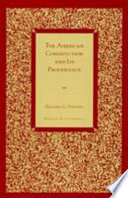 Thirdly, the supreme power cannot take from any man any part of his property without his own consent. For the preservation of property being the end of government, and that for which men enter into society, it necessarily supposes and requires that the... Thirdly, the supreme power cannot take from any man any part of his property without his own consent. For the preservation of property being the end of government, and that for which men enter into society, it necessarily supposes and requires that the...  The Political Register for ... - Página 1851769Visualização completa The Political Register for ... - Página 1851769Visualização completa - Sobre este livro
 | David Andrew Schultz - 1992 - 244 páginas
...only a tool of economic development.44 These natural rights are not lost to the state: The Supream Power cannot take from any Man any Part of his Property without his own consent. For the preservation of Property being the end of Government, and that for which Men enter... | |
 | Philip J. Kain - 1993 - 450 páginas
...seems to me that this is the case for Locke. Consider the following very important passage: The Supream Power cannot take from any Man any part of his Property without his own consent. For the preservation of Property being the end of Government, and that for which Men enter... | |
 | Steven M. Dworetz - 1994 - 268 páginas
...straight to the heart of the matter. This section begins with Locke's insistence that "the supreme power cannot take from any man any part of his property without his own consent." And it includes the statement that "no body hath a right to take their substance or any part... | |
 | Vere Claiborne Chappell - 1994 - 354 páginas
...and duties of individuals and the origins of political society. "The Supream Power," Locke declares, "cannot take from any Man any part of his Property without his own consent." For if someone could take "any part" of my property without my consent, he could take it... | |
 | Gerald Allan Cohen - 1995 - 292 páginas
...grounded. That is why II: 138 emphasizes - on Tully's account, unintelligibly - that the legislature 'cannot take from any man any part of his property without his own consent': if the legislature distributed property in the first place, it could surely redistribute... | |
 | United States. Congress. Senate. Committee on Environment and Public Works - 1996 - 240 páginas
...has always been an integral 6 John Locke, Two Treatises of Government, Book II, f 138 ('The Supreme Power cannot take from any Man any Part of his Property without his own consent. For the preservation of Property being the end. of Government, and that for which Men enter... | |
 | James W. Ely - 1997 - 438 páginas
...John Locke gets to the heart of the mauer in his Essay on Civil Government:°5 Thirdly, The Supream Power cannot take from any Man any part of his Property without his own consent. For the preservation of Prop50. Stat. 6Hen. 8. c. 1711514.15151. 51. Stat.31 Hen. 8. c. 411539l.... | |
 | Harold Joseph Laski - 1958 - 332 páginas
...the making of Locke's hypotheses. He summarized, he did not innovate, when he said that "the supreme power cannot take from any man any part of his property without his own consent". 101 He shared the view of his contemporaries that the men of property are the natural rulers... | |
 | Richard G. Stevens - 1997 - 410 páginas
...some hope, but only for a moment, of a truly substantive limit. It begins thus: "Thirdly, the Supreme Power cannot take from any Man any part of his Property without his own consent." But in the same breath he speaks of men's goods as "goods which, by the law of the community... | |
 | Kathy Sammis - 1997 - 130 páginas
...essential, inherent, and inseparable rights of our fellow subjects in Great Britain. . . . The supreme power cannot take from any man any part of his property without his consent in person or by representation. . . . Now: can there be any liberty where property is taken... | |
| |